
Roberto Durán Samaniego is a former professional boxer who competed from 1968 to 2001. He held world championships in four weight classes: lightweight, welterweight, light middleweight and middleweight, as well as reigns as the undisputed and lineal lightweight champion, and the lineal welterweight champion. He is also the second boxer to have competed over a span of five decades, the first being Jack Johnson. Durán was known as a versatile, technical brawler and pressure fighter, which earned him the nickname of "Mano de Piedra" for his formidable punching power and excellent defense.
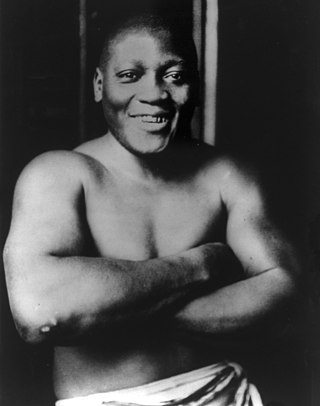
John Arthur Johnson, nicknamed the "Galveston Giant", was an American boxer who, at the height of the Jim Crow era, became the first black world heavyweight boxing champion (1908–1915). His 1910 fight against James J. Jeffries was dubbed the "fight of the century". Johnson defeated Jeffries, who was white, triggering dozens of race riots across the U.S. According to filmmaker Ken Burns, "for more than thirteen years, Jack Johnson was the most famous and the most notorious black boxer on Earth". He is widely regarded as one of the most influential boxers in history. Transcending boxing, he became part of the culture and history of racism in the United States.
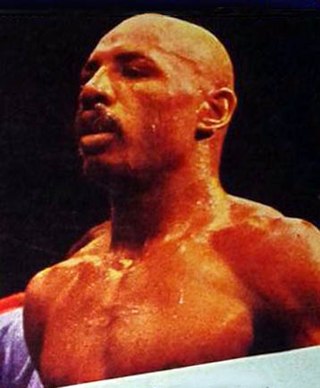
Marvelous Marvin Hagler was an American professional boxer. He competed in boxing from 1973 to 1987 and reigned as the undisputed champion of the middleweight division from 1980 to 1987, making twelve successful title defenses, all but one by knockout. Hagler also holds the highest knockout percentage of all undisputed middleweight champions at 78 percent. His undisputed middleweight championship reign of six years and seven months is the second-longest active reign of the 20th century. He holds the record for the sixth longest reign as champion in middleweight history. Nicknamed "Marvelous" and annoyed that network announcers often did not refer to him as such, Hagler legally changed his name to "Marvelous Marvin Hagler" in 1982.

Ray Charles Leonard, best known as "Sugar" Ray Leonard, is an American former professional boxer, motivational speaker, and occasional actor. Often regarded as one of the greatest boxers of all time, he competed professionally between 1977 and 1997, winning world titles in five weight classes; the lineal championship in three weight classes; as well as the undisputed welterweight championship. Leonard was part of the "Four Kings", a group of boxers who all fought each other throughout the 1980s, consisting of Leonard, Roberto Durán, Thomas Hearns, and Marvin Hagler. Leonard also won a light welterweight gold medal at the 1976 Summer Olympics.
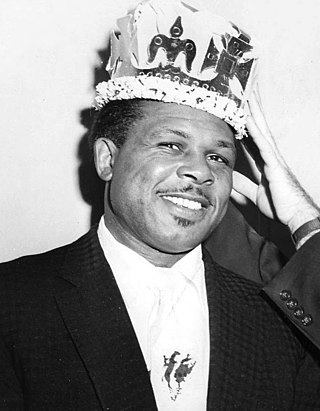
Archie Moore was an American professional boxer and the longest reigning World Light Heavyweight Champion of all time. He had one of the longest professional careers in the history of the sport, competing from 1935 to 1963. Nicknamed "The Mongoose", and then "The Old Mongoose" in the latter half of his career, Moore was a highly strategic and defensive boxer. As of December 2020, BoxRec ranks Moore as the third greatest pound-for-pound boxer of all time. He also ranks fourth on The Ring's list of "100 greatest punchers of all time". Moore was also a trainer for a short time after retirement, training Muhammad Ali, George Foreman, Bob Foster, Eddie Mustapha Muhammed, Earnie Shavers and James Tillis.

Roy Levesta Jones Jr. is an American professional boxer who holds dual American and Russian citizenship. He has held multiple world championships in four weight classes, including titles at middleweight, super middleweight, light heavyweight, and heavyweight, and is the only boxer in history to start his professional career at light middleweight and go on to win a heavyweight title. As an amateur boxer he represented the United States at the 1988 Summer Olympics, winning a light middleweight silver medal after one of the most controversial decisions in boxing history.

Primo Carnera, nicknamed the Ambling Alp, was an Italian professional boxer and wrestler who reigned as the boxing World Heavyweight Champion from 29 June 1933 to 14 June 1934. He won more fights by knockout than any other heavyweight champion in boxing history.
Heavyweight is a weight class in combat sports and professional wrestling.

John Edmund Gardner was an English spy and thriller novelist, best known for his James Bond continuation novels, but also for his series of Boysie Oakes books and three continuation novels containing Sir Arthur Conan Doyle's fictional villain, Professor Moriarty.

Ernest Terrell was an American professional boxer who competed from 1957 to 1973. He held the World Boxing Association's heavyweight title from 1965 to 1967, and was one of the tallest heavyweights of his era, at 6 feet 6 inches (1.98 m) tall. He unsuccessfully fought the other world heavyweight champion of the era, Muhammad Ali, in a heavyweight title unification contest in 1967, losing by a unanimous decision. Terrell was the elder brother of the Supremes' early 1970s lead singer Jean Terrell. In the 1960s, Jean sang with Ernie's group Ernie Terrell & the Heavyweights.
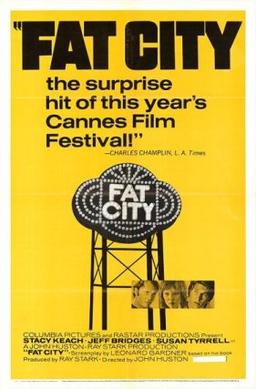
Fat City is a 1972 American sports drama film directed and produced by John Huston, and adapted by Leonard Gardner from his 1969 novel of the same title. It stars Stacy Keach, Jeff Bridges, Susan Tyrrell, and Candy Clark in her film debut.
Leonard Gardner is an American novelist, short story writer, and screenwriter. His writing has appeared in The Paris Review, Esquire, The Southwest Review, and other publications, and he has been awarded a Guggenheim Fellowship.

George Gardiner was a famous Irish boxer in America who was the first undisputed World Light Heavyweight Champion. He held claims to both the World Middleweight Title as well as the World Heavyweight Title. He was the second man in history to hold the World's Light Heavyweight title, defeating the first Light Heavyweight Champion, Jack Root, by KO after 12 rounds.

Richard Eklund Jr. is an American former professional boxer who competed from 1975 to 1985. Known as "The Pride of Lowell", he held the USA New England welterweight title twice between 1979 and 1983. He is the half-brother and former trainer of former WBU champion Micky Ward. The 2010 biopic The Fighter is based on the two brothers' fall and rise to the boxing title.

In the Courts of the Crimson Kings is a 2008 alternate history science fiction novel by American writer S. M. Stirling.
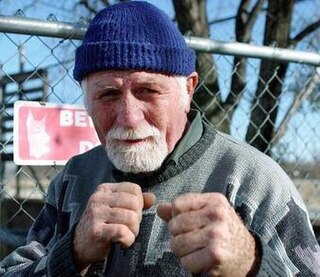
Ernie "Indian Red" Lopez was an American professional boxer. He twice fought for the world welterweight boxing title, losing title bouts to José Nápoles in 1970 and 1973. He was a missing person from 1992 to 2004 and was the subject of extensive press coverage in early 2004 when, after being selected for induction into the California Boxing Hall of Fame, he was found at a homeless shelter in Fort Worth, Texas.

J Russell Peltz is an American boxing promoter. A member of the International Boxing Hall of Fame and the World Boxing Hall of Fame, Peltz has promoted fights at the Arena, Spectrum, The Blue Horizon, several Atlantic City casinos and at the 2300 Arena in South Philadelphia and the PARX Casino in Bensalem, PA.

Luis Federico Thompson was an Argentine professional boxer. Born in Colon, Panama, he later moved to Argentina where he was nationalized and afterwards became the Argentine and South American boxing champion.















